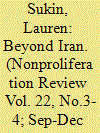|
|
|
Sort Order |
|
|
|
Items / Page
|
|
|
|
|
|
|
| Srl | Item |
| 1 |
ID:
144288


|
|
|
|
|
| Summary/Abstract |
Several states in the Middle East have noted their interest in nuclear energy programs, but current cost and timeline estimates understate the difficulties that these states will face. A state-level analysis of nuclear development capacities in Saudi Arabia, Egypt, Jordan, Turkey, and the United Arab Emirates suggests that building nuclear infrastructure in the region will, in fact, be a lengthy and expensive endeavor, due to concerns such as export constraints, public opposition, a lack of human resources, and high overhead costs. This has implications for nuclear weapon nonproliferation: first, fears that these developing nuclear energy capabilities may facilitate possible weapon proliferation are premature, and second, there is time to ensure that any burgeoning nuclear infrastructure in the region remains safe and civilian in nature.
|
|
|
|
|
|
|
|
|
|
|
|
|
|
|
|
| 2 |
ID:
144286


|
|
|
|
|
| Summary/Abstract |
While nuclear suppliers compete in markets, they simultaneously partner in other fields. This produces a delicate relationship between civilian nuclear programs and nuclear weapon proliferation. This study explores how export competition affects suppliers’ conditions of supply related to nuclear nonproliferation. We investigated three export cases (India, North Korea, and South Korea) and identified four effects that competition has on the conditions of supply related to nonproliferation. First, under highly competitive conditions, suppliers might hesitate to enforce the conditions of supply to avoid negotiation conflicts with recipients. Second, suppliers focus on politically and economically attractive recipients while mostly ignoring unattractive ones, perhaps allowing proliferation problems to fester out of view in marginal states. Third, suppliers can build consensus on the conditions of supply to avoid being the only party experiencing negotiation conflicts. Fourth, suppliers can constrain others from relaxing the conditions of supply to maintain economic benefits and nonproliferation norms. The first two effects accelerate proliferation while the last two promote nonproliferation. Although the extent of these effects can vary with changes in nonproliferation norms, they can contribute to our understanding of the relationship between nonproliferation and civilian nuclear programs.
|
|
|
|
|
|
|
|
|
|
|
|
|
|
|
|
|
|
|
|
|